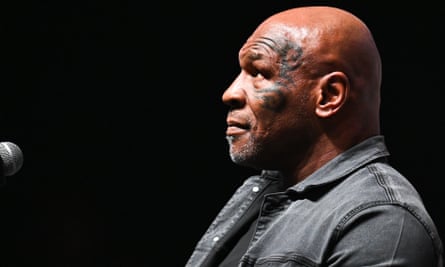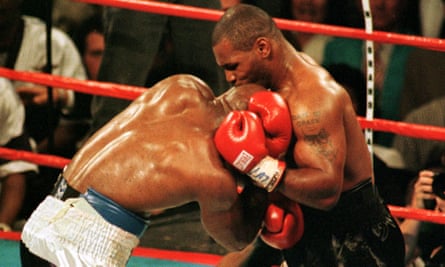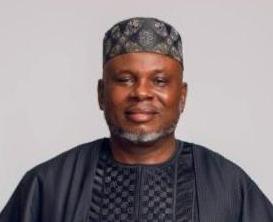Mike Tyson sat in almost magnificent silence, refusing to engage in the bombast and bluster of the final press conference before he fights Jake Paul in a charade of a contest on Friday night in Arlington, Texas. As I stared at his familiar tattooed face I remembered what he had told me on a sweltering afternoon in the summer of 1991.
We sat then in a stinking Las Vegas gym and Tyson tapped me on the hand in reminder of a bleak truth. “Look what happens to fighters,” he said, “even the best of them. Joe Louis ended up a doorman at Caesars Palace. He was in a wheelchair at the end. Sonny Liston died in this town, a drunk and a junkie with no money. Even Ali, look at Ali. I love Ali but when they introduce him at my fights I look away. Sure, they cheer him, but where’s his beauty now, his speed, his talent? It’s gone … it’s gone.”
I wondered what Tyson might have thought if he had been told then that, in November 2024, at the age of 58, he would be wheeled back into the ring to fight a 27-year-old novice boxer who became famous on something called the internet, where the kid made dumb videos on a mysterious entity known as YouTube. I reckon Tyson would have cackled in dark disbelief if he heard next that he would make $20m (£15.7m) for the stunt while the big-talking non-boxer would rake in $40m.
Ariel Helwani, the astute and polished combat sports journalist hosting the Texas press conference, tried hard with Tyson. But there was no shifting old Mike. “I’m ready to fight,” was his most expansive comment as Helwani asked him about the supposed significance of a scrap against Paul on Netflix.
Helwani opened up the presser to other reporters. They also did their best but Tyson remained mute or mumbled a few words. He became engaged only when a female journalist asked a thoughtful question that ended with her wondering: “What would you lose if you lose this fight?”
Tyson leaned forward and spoke clearly. “I’m not gonna lose.”
She returned to an old quote of Tyson’s where he addressed the consequences of defeat in a different context. “I’m not gonna lose,” Tyson repeated.

Tyson has always understood why people clamour to see him, why they scramble to be near him. In the past those closest to him wanted his money, but the rest of us were looking for something different. Tyson was only 19 when, in May 1986, he nailed it in 10 words: “People want entertainment, intrigue. I give them what they want.”
Between the ropes, if entertainment is the opposite of boredom, Iron Mike was a performer of immeasurable power. He made us fix our eyes on his shattering capacity for violence. He won his first 19 bouts by knockout, 12 coming in the opening round. In November 1986, 38 years ago this month, he became the youngest world heavyweight champion in history after hitting Trevor Berbick with such force that the Jamaican reeled across the ring, fell, got up, toppled over, staggered to his feet and lurched into the opposite corner where he collapsed again.
When it was over, that excitement faded into a kind of unsettled fascination. Where did Tyson find such ferocity – what must have been done to him to make him that frightening?
The last time I interviewed Tyson, in 2014, we spoke over two days at his office in Henderson, on the outskirts of Vegas. He returned to his childhood in Brownsville, a harsh ghetto in New York: “I was a pudgy kid, very shy, and I spoke with a lisp. The kids called me ‘Little Fairy Boy’.”
Tyson recalled that, “once, my mother was fighting with this guy, Eddie, and it’s barbaric. Eddie knocked out her gold tooth and me and Denise [Tyson’s sister] are screaming. But my mother’s real slick. She puts on a pot of water. The next thing I know she’s pouring boiling water over Eddie. He was screaming, his back and face covered in blisters. We put him on the floor. My sister takes a lighter and sterilises a needle and then, one by one, she bursts the blisters.”
Tyson didn’t use such trauma to justify his malevolence. He said: “I look back at the life I once had and see that I didn’t have an emotional problem. I had a morality problem. I was without any morals.” He added: “That’s all I once knew – how to hurt people.”
It’s important to never forget that, in 1992, Tyson was jailed for the rape of Desiree Washington. Her father, Donald, had been an ardent Tyson fan. All his adoration crumbled when his daughter said: ‘Dad, I’ve got some bad news for you … he raped me.”
Tyson always denied the allegation but, when prison came, his grim mystery grew. “Mike Tyson belongs in a cage,” George Foreman suggested. “I think he needs to be sheltered like you should shelter a lion or a tiger. You lock him up, except when you want him to come out and jump through a few hoops. When that’s over, you lock him up again.”
Desiree Washington has avoided publicity while Tyson claimed some kind of redemption from the sins of his past. But he has also been lost in endless struggles with drink, drugs and depression. He is now locked in the lunacy of this week.
Tyson knows what it is like to work in a circus. It was Iron Mike, after all, who descended into madness in June 1997 when he fought Evander Holyfield for a second time. Jake Paul was only six months old when Tyson bit down on the top half of Holyfield’s right ear. The skin of Tyson’s face, from his eye to his jaw, pulled tight in an awful grimace as if he had suffered a sudden stroke. But instead, he turned his head to the left with savage torque and tore at the gristly flesh.
A part of Holyfield’s ear ended up in Tyson’s mouth. As shock and agony spread in equal measure across Holyfield’s face, Tyson stepped back and spat in disgust. The piece of ear shot from his mouth like a wad of gum. Tyson opened his arms and pointed accusingly at the canvas as if he could not believe what Holyfield had just done in slipping an unwanted piece of cartilage into his mouth.

All these memories tumbled through me on Wednesday night as people whooped at the sight of Tyson in Texas. Paul was frustrated. “It’s cute,” he initially said of Tyson’s reticence. But then the YouTuber declared: “I fear no man. I want him to be that old savage Mike … I want there to be no excuses when I knock him out.”
Paul then complained directly to Tyson: “There’s a lot of shit-talk online saying you’re going to kill me, and just nothing in person. Is that what you’re going to do?”
Tyson shrugged. “I’m just ready.”
Paul looked irate. “It’s pretty fucking boring,” he whined.
He rose from his seat to challenge the fighters on the undercard who had picked Tyson to beat him. Nine of those 12 fighters sided with Tyson and Paul goaded many of them into taking bets on the outcome.
Tyson knows that, closing on 60 and having been out of the ring so long, none of this matters. He has little left but so many terrible things have happened in his life, or been meted out to others by him, that there is nothing new to say. He sank deeper into silence.
The mundane mayhem rattled on and Tyson gazed steadily into the distance. He was waiting for the moment it would finally end and he could walk away with his money.










More Stories
Tinubu considers Fani-Kayode, others for ambassadorial appointments
NBA intervenes, as detention of 15 domestic aides accused of theft from ex-First Lady Patience Jonathan, lingers
Church elder reveals how Adeboye banned Iluyomade from stepping into RCCG, called members who defected demons